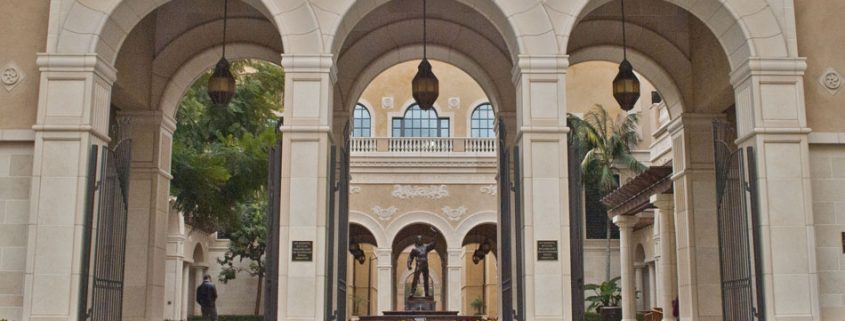SCA responds to students’ protest against John Wayne exhibit

(Photo from Eric Plant/Instagram)
The School of Cinematic Arts will talk with students in the coming days about how to address the school’s exhibit honoring controversial film star John Wayne, Interim Assistant Dean of Diversity and Inclusion Evan Hughes wrote in a statement to the Daily Trojan Sunday.
The decision follows a protest Friday in which two students held up a banner in front of the SCA asking for the removal of The Wayne Collection and accusing the school of “endorsing white supremacy” for honoring the actor.
“Our values as an inclusive community are predicated on the idea that our student population needs to be heard and have a say about our SCA environment, especially when information comes to light that changes how we relate to it,” Hughes said.
Eric Plant, a junior majoring in fine arts, said they created the banner because of Wayne’s controversial stances and portrayal of Native Americans in film. The banner calls Wayne “a blatant racist” and states that the actor promoted the genocide of indigenous Americans in his films.
“By keeping Wayne’s legacy alive, SCA is endorsing white supremacy,” the banner read.
Wayne attended and played football for USC before becoming an actor but is controversial for his stance on the treatment of people of color and indigenous people throughout history.
The Wayne Collection exhibit, which features a statue of Wayne along with several of his personal items in glass cases, was dedicated in June 2012. The collection contains a variety of Wayne film posters, memorabilia, awards and letters.
“I’m going to go every minute that I have and stand there,” Plant said. “I had conversations while I was standing there, and I was getting people to support it. I would like to keep being there and keep having a presence there.”
Plant said they hope to create larger banners and rally people to protest in front of SCA.
“If we can get enough students and if we can get enough faculty to say that this exhibit bothers them, they either have to take the choice of the people that they’re supposed to be representing, or they take the choice of John Wayne and all that terrible white supremacy,” Plant said.
Plant cited a 1971 Playboy interview with John Wayne in which the star expressed support for white supremacy and the removal of indigenous Americans from their land when discussing their reason for protesting the exhibit.
“I believe in white supremacy,” Wayne said during the 1971 interview, which resurfaced earlier this year. “We can’t all of a sudden get down on our knees and turn everything over to the leadership of the Blacks.”
Later in the interview, Wayne said that he didn’t feel bad for the treatment of indigenous people throughout America’s history.
“I don’t feel we did wrong in taking this great country away from them,” Wayne said then. “Our so-called stealing of this country from them was a matter of survival. There were great numbers of people who needed new land, and the Indians were selfishly trying to keep it for themselves.”
Plant said they had been working with the Diversity and Inclusion Office at SCA to get the exhibit removed, but believe that protesting will be the most effective means of creating change. SCA has hosted multiple events related to Wayne, and during a 2008 celebration for what would have been his 100th birthday, the school organized an event called “John Wayne: Actor, Star, Icon, Trojan.”
Plant added that SCA removed nine items from the exhibit in an attempt to more accurately reflect Wayne’s legacy, but Plant believes the exhibit is still problematic.
“When you walk through and see a statue, or you walk through an exhibit of glass cases, you have this sense that this person is important and that this person is this heroic stamp,” they said.
According to Plant, the SCA Diversity and Inclusion Board suggested placing a plaque in the exhibit in order to contextualize and critique Wayne’s legacy. But some students feel that this action does not go far enough to address the injustice.
“That’s not enough,” said Saul Singleton, a sophomore majoring in cinematic arts, film and television production. “I feel like SCA’s trying to give a quick solution that won’t resolve the problem by putting a small section of indigenous point of view.”

